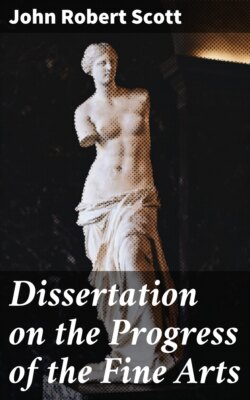Читать книгу Dissertation on the Progress of the Fine Arts - John Robert Scott - Страница 4
На сайте Литреса книга снята с продажи.
Footnote
ОглавлениеTable of Contents
[1] Among the works that I have seen which specifically develop this argument are: Thomas Blackwell, An Enquiry into the Life and Writings of Homer (1735); Richard Hurd, The Third [Elizabethan] Dialogue (1759) and Letters on Chivalry and Romance (1762); John Ogilvie, "An Essay on the Lyric Poetry of the Ancients," in Poems on Several Subjects (1762); John Brown, A Dissertation of the Rise, Union, and Power, the Progressions, Separations, and Corruptions of Poetry and Music (1763) and a shorter version of the Dissertation, The History of the Rise and Progress of Poetry (1764); Hugh Blair, A Critical Dissertation on the Poems of Ossian (1763); William Duff, An Essay on Original Genius (1767); Robert Wood, An Essay on the Original Genius and Writings of Homer (1767, enlarged version 1769); Thomas Pownall, A Treatise on the Study of Antiquities (1782). Such a list, however, if it were to indicate the scope and ramifications of the argument would have to be expanded to include more general eighteenth-century studies of the evolution of cultural forms; for the argument on the nature of art and its relation to "primitive" societies is part of a larger one centering on the whole idea of progress. Treatment of the whole subject has never been fully integrated into a study of the nature (or natures) of eighteenth-century criticism and critical theory—although a start has been made on study of it in and of itself. The basic treatment remains Lois Whitney's Primitivism and the Idea of Progress (Baltimore, 1934) and her two essays "English Primitivistic Theories of Epic Origins," MP, XXI (1924), 337-378 and "Thomas Blackwell, a Disciple of Shaftesbury," PQ, V (1926), 196-211. These are to be considerably qualified in their general, sociological orientation by Gladys Bryson's Man and Society: The Scottish Inquiry of the Eighteenth Century (Princeton, 1945). They are further to be qualified in their literary-critical orientation by my "The Eighteenth-Century Scottish Primitivists: Some Reconsiderations," ELH, XII (1945), 203-220, which is in turn somewhat expanded upon and generalized in the appendix to Ernest Tuveson's Millenium and Utopia: A Study in the Background of the Idea of Progress (Berkeley, 1949).
[2] See, for example, Donald Foerster, "Scottish Primitivism and the Historical Approach," PQ, XXIX (1950), 307-323.
[3] The essay was republished in 1804 as part of Scott's Dissertations, Essays, and Parallels. These pieces range from college premium compositions of the 1770's to the "Dissertation" of 1800.
[4] The essay is handily available in W. J. Bate's anthology, Criticism: The Major Texts (New York, 1952), pp. 292-295.
